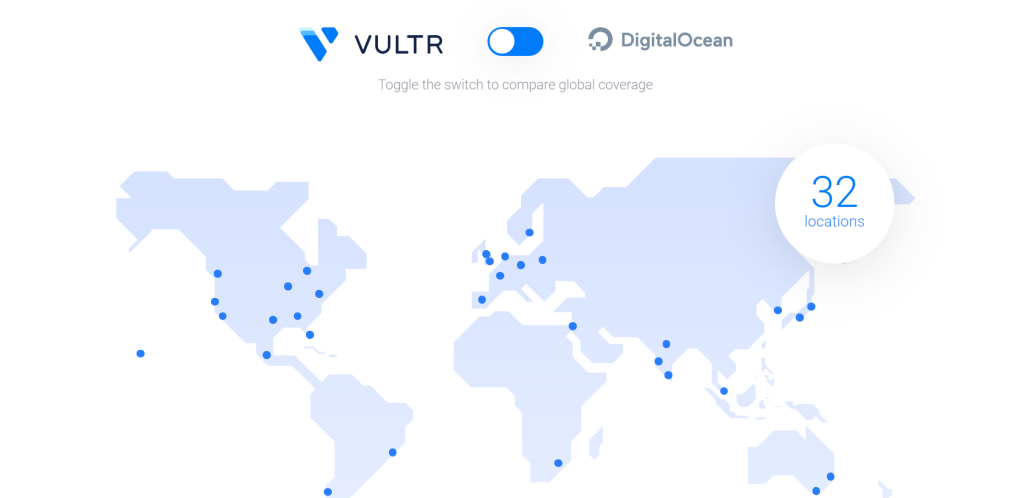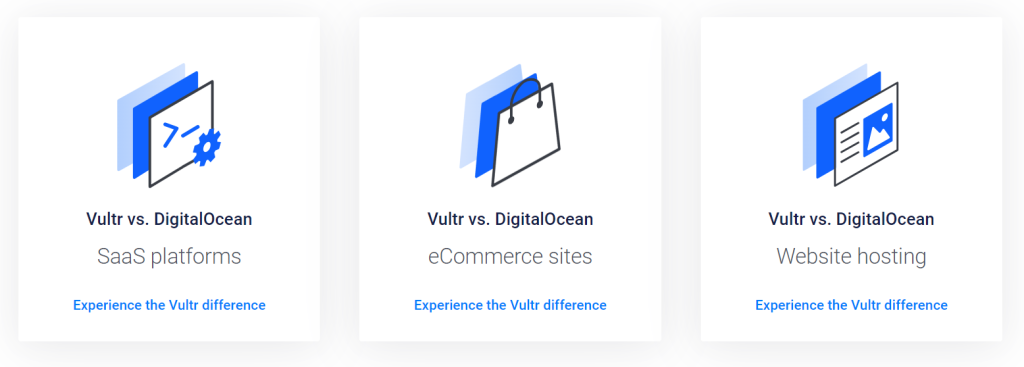Introduction
In today’s digital landscape, cloud storage has become a vital component for businesses and developers. With an exponential growth in demand for cloud storage solutions, it’s essential to choose the right provider that meets your specific requirements. In this article, we will compare two leading cloud storage solutions: DigitalOcean and Vultr. We will delve into their features, pricing, functionalities, and more to help you make an informed decision.

What is a Cloud Storage Solution?
Before we dive into the comparison, let’s first understand what a cloud storage solution entails. Cloud storage systems offer a range of services, from personal storage for backing up personal files to enterprise storage for secure data storage and transfer. These systems provide scalability, remote access, and application-agnostic capabilities for businesses of all sizes.
There are three main models of cloud storage: public cloud storage, private cloud storage, and hybrid cloud storage. Public cloud storage is suitable for unstructured data and is accessible from anywhere. Private cloud storage offers more control and security by being protected behind a company firewall. Hybrid cloud storage combines public and private cloud services for increased flexibility.

DigitalOcean: A Closer Look
DigitalOcean is a renowned cloud hosting company that offers various services, including Virtual Private Servers (VPS) known as “droplets.” With DigitalOcean, you can select your operating system during deployment and customize your VPS to your satisfaction. The company takes care of hardware maintenance, allowing you to focus on scaling your applications effortlessly.
The main product categories offered by DigitalOcean are droplets (compute servers) and storage. Droplets come in various sizes and configurations, catering to different requirements. From a single CPU droplet for $5 per month to powerful 32 CPU servers powered by the latest Intel chips, DigitalOcean offers a wide range of options. Additionally, DigitalOcean provides network services like load balancers, firewalls, and DNS, each equipped with user interfaces, APIs, CLIs, and client libraries for easy control.
Vultr: An Overview
Vultr, established in 2014, is a rapidly expanding cloud infrastructure provider known for its reliable SSD storage and global presence. With 23 data centers worldwide, Vultr offers cloud servers to over 200,000 customers in 150 locations. The company’s mission is to deliver optimized cloud infrastructure at affordable prices, ensuring superior performance and cost-effectiveness.
Vultr’s product offerings include cloud compute, bare metal servers, dedicated cloud, load balancers, object storage, and block storage. With an extensive global network, Vultr ensures low latency, high performance, and reliable cloud services for users across six continents. The company recently expanded its data center footprint by opening new centers in Madrid, Warsaw, and Melbourne.
Comparative Overview of Features Offered by DigitalOcean & Vultr
To have a comprehensive understanding of DigitalOcean and Vultr, let’s compare their key features side by side:
| Feature/Solution | DigitalOcean | Vultr |
|---|---|---|
| Storage Size | Non-Customizable | Non-Customizable |
| Server Size | 1, 2, 4, 8, 16, 32, 64, 128 (in GB) | 1, 2, 4, 8, 16, 32, 64, 96 (in GB) |
| Latency | 47.169 ms | 47.006 ms |
| Download Speed | 1319.01 Mbit/s | 288.73 Mbit/s |
| Upload Speed | 503.26 Mbit/s | 502.83 Mbit/s |
| DDOS Protection | No | Yes |
| Backups | Yes | Yes |
| Backstorage | Yes | Yes |
| Object Storage | Yes | Yes |
| SSH Keys Set Up | Yes | Yes |
| Hourly Billing | Yes | Yes |
| Control Panel | Built-in | Built-in |
| Total Number of Data Centers | 12 | 21 |
| Number of Data Center Continents | 3 | 4 |
| Monitoring Charts | Yes | Yes |
| Admin Rest API | Yes | Yes |
| Upgrade VPS from Admin Console | Yes | Yes |
| Mobile Friendly UI | Yes | Yes |
| Reverse DNS | No | Yes |
| Hidden CPU Model | No | Yes |
| Affiliate Program | Yes | Yes |
| Shelving | No | No |
| Firewall | No | Yes |
| Team Management | Yes | Yes |
Pricing: DigitalOcean vs. Vultr
Pricing is a crucial factor to consider when choosing a cloud storage solution. Let’s take a look at the pricing plans offered by DigitalOcean and Vultr:
DigitalOcean Pricing
DigitalOcean offers simple plans with defined resource restrictions, making it easy to predict monthly costs. The company’s service plans, known as “droplets,” come with various features and add-ons. Here are some examples of DigitalOcean pricing:
- $5 per month for 1 core, 1 GB of RAM, 25 GB SSD, and 1 TB transfer
- $10 per month for 1 core, 2 GB of RAM, 50 GB SSD, and 2 TB transfer
- $20 per month for 2 cores, 4 GB RAM, 80 GB SSD, and 4 TB transfer
For more detailed pricing information, you can visit the DigitalOcean pricing calculator on their website.
Vultr Pricing
Like DigitalOcean, Vultr offers simple plans with defined resource restrictions, ensuring predictable monthly costs. Here are some examples of Vultr pricing:
- $5 per month for 1 core, 1 GB of RAM, 25 GB SSD, and 1 TB transfer
- $10 per month for 1 core, 2 GB of RAM, 50 GB SSD, and 2 TB transfer
- $20 per month for 2 cores, 4 GB RAM, 80 GB SSD, and 3 TB transfer
Vultr also provides a high-frequency server option, which offers faster performance but at a slightly higher cost. This option is suitable for websites with high traffic or resource-intensive applications. For more detailed pricing information, you can visit the Vultr website.
DigitalOcean vs. Vultr: Key Features and Functionalities
Now that we have explored the pricing aspects, let’s dive deeper into the key features and functionalities offered by DigitalOcean and Vultr:
Products Offered
DigitalOcean offers a range of products, including Kubernetes, Space, App Platform, Droplets, and Databases. Each of these products caters to different needs and provides a comprehensive solution for businesses and developers.
On the other hand, Vultr offers Cloud Compute, Bare Metal, Dedicated Cloud, Load Balancers, Object Storage, and Block Storage. These products cover a wide range of requirements, allowing users to find the perfect fit for their specific needs.
Storage
Storage is a critical factor when considering a cloud storage solution. Both DigitalOcean and Vultr provide ample storage space for basic activities. However, as your website or application grows in popularity, it’s essential to have a server that can handle the increased traffic and data flow.
In terms of storage capacity, DigitalOcean has an edge over Vultr. With its competitive plans and the ability to expand storage as needed, DigitalOcean ensures that businesses can scale seamlessly.
cPanel
cPanel is a vital website management platform that helps users monitor and run their websites effectively. Both DigitalOcean and Vultr offer seamless integration with cPanel applications, allowing users to manage email accounts, databases, security settings, and file transfers effortlessly.
However, when it comes to pricing, there is a slight difference between the two solutions. Vultr charges $15 to install the cPanel application, while DigitalOcean allows users to create a droplet for cPanel and WHM for free. Vultr, on the other hand, provides a user-friendly interface for website management and file transfers, making it a preferred choice for some users.
Bandwidth
Sufficient bandwidth is crucial to ensure smooth website performance, especially when dealing with high traffic and data exchange. Both DigitalOcean and Vultr offer sufficient bandwidth in their basic plans to handle a considerable number of users visiting a website simultaneously.
DigitalOcean’s basic offering can handle 50,000 users per month with 1GB of memory and a 25GB SSD. If your traffic exceeds this threshold, you can easily upgrade to an intermediate or premium plan based on your requirements.
Vultr stands out by explicitly stating its bandwidth restrictions in its plans. The entry-level plan offers 500GB of bandwidth, with options to scale up to 15TB for websites with millions of visitors. This explicit communication of bandwidth limits makes Vultr a preferred choice for users who require high-performance websites.
OS Support
Operating System (OS) support is a crucial aspect when choosing a cloud storage solution. Vultr offers a wide range of OS options, including Windows Server 2012 R2 and Server 2016 variants. Customers can load these OS options using Vultr’s custom ISO option. Vultr also provides official OS alternatives and CentOS-based preset application installations.
DigitalOcean, on the other hand, offers a good selection of applications but falls behind Vultr in terms of OS support. It does not provide custom ISO options and offers fewer OS choices compared to Vultr.
Security
Security is of utmost importance when storing data in the cloud. Both DigitalOcean and Vultr prioritize security and offer various measures to protect user data. They provide features like Cloud Firewalls, physical security, infrastructure security, access logging, security monitoring, snapshot security, and backup security.
Vultr’s DDoS protection stands out as it can detect and filter traffic effectively, ensuring that your server remains protected during attacks. While DigitalOcean offers robust security measures, Vultr’s DDoS protection is more comprehensive and user-friendly.
Support
Customer support is crucial when dealing with cloud storage solutions. Both DigitalOcean and Vultr offer excellent customer support, but there are slight differences in their approaches.
DigitalOcean provides exceptional customer support through live chat, a knowledge base, and tutorials. The company has received a high customer satisfaction rating and holds an A+ rating from the Better Business Bureau.
Vultr also offers live chat support, a ticketing system, and a comprehensive knowledge base on their website. They aim to provide users with all the necessary resources to address any questions or issues effectively.
Final Verdict
In conclusion, both DigitalOcean and Vultr are solid choices for cloud storage solutions. DigitalOcean offers a wide range of products, extensive data center coverage, and competitive pricing plans. It is an ideal option for those seeking a straightforward and feature-packed cloud storage solution.
On the other hand, Vultr stands out with its optimized cloud infrastructure, global reach, and explicit bandwidth communication. The company’s commitment to cost-effectiveness and superior performance makes it a preferred choice for businesses and developers.
Ultimately, the choice between DigitalOcean and Vultr depends on your specific requirements, budget, and preferences. Consider factors like storage capacity, pricing, OS support, security features, and customer support when making your decision. Both DigitalOcean and Vultr provide reliable cloud storage solutions, and you can’t go wrong with either option.
